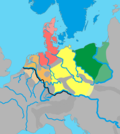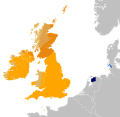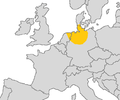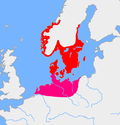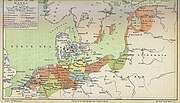historical linguistics, the Ingvaeonic nasal spirant law (also called the Anglo-Frisian or North Sea Germanic nasal spirant law) is a description of a phonological...
10 KB (1,257 words) - 09:53, 27 July 2024
North Sea Germanic (redirect from Ingvaeonic)
(Ingvaeonic A). Linguistic evidence for Ingvaeonic B observed in Old Frisian, Old English and Old Saxon is as follows: The so-called Ingvaeonic nasal spirant...
8 KB (910 words) - 21:34, 30 August 2024
Germanic languages due to several sound changes: besides the Ingvaeonic nasal spirant law, which is present in Low German as well, Anglo-Frisian brightening...
25 KB (1,803 words) - 14:12, 21 August 2024
partially shares Anglo-Frisian's (Old Frisian, Old English) Ingvaeonic nasal spirant law which sets it apart from Low Franconian and Irminonic languages...
32 KB (2,216 words) - 09:43, 13 October 2024
spelling and pronunciation Grimm's law High German consonant shift History of English Ingvaeonic nasal spirant law Phonological history of English vowels...
30 KB (2,863 words) - 15:07, 20 October 2024
Phonological history of Old English (category Sound laws)
five, mouth, us versus German fünf, Mund, uns. For detail see Ingvaeonic nasal spirant law. The Anglo-Frisian languages underwent a sound change in their...
84 KB (8,849 words) - 12:47, 3 October 2024
History of French (section Nasal vowels)
"us") in colloquial French (first-person plural pronoun, see Ingvaeonic nasal spirant law), from Old French (h)om, a reduced form of homme "man", was a...
80 KB (9,554 words) - 20:52, 22 September 2024
suppression of the Germanic nasal in a word like us (ús), soft (sêft) or goose (goes): see Ingvaeonic nasal spirant law. Also, when followed by some...
28 KB (2,734 words) - 03:21, 19 October 2024
split into early Old English and early Old Frisian. Ingvaeonic nasal spirant law: Loss of nasals before fricatives, with nasalization and compensatory...
76 KB (8,394 words) - 00:18, 19 October 2024
Germanic sound shifts (redirect from Germanic sound laws)
Gothic) Great Vowel Shift (English) High German consonant shift Ingvaeonic nasal spirant law (attested in Old English, Old Frisian and Old Saxon) West Germanic...
922 bytes (121 words) - 23:29, 24 November 2022
The West Germanic branch is classically subdivided into three branches: Ingvaeonic, which includes English, the Low German languages, and the Frisian languages;...
56 KB (4,768 words) - 01:30, 19 October 2024
are only partially preserved in Low German, for instance the Ingvaeonic nasal spirant law (some dialects have us, os for "us" whereas others have uns,...
115 KB (8,367 words) - 00:17, 17 October 2024
Lombardic) into Old High German. At more or less the same time the Ingvaeonic nasal spirant law, moving over Western Europe from west to east, led to the development...
190 KB (19,009 words) - 05:50, 20 October 2024
Proto-Germanic language (section Nasal vowels)
inherited, but were joined by new nasal vowels resulting from the Ingvaeonic nasal spirant law, which extended the loss of nasal consonants (only before -h-...
130 KB (12,136 words) - 10:03, 15 September 2024
certain coda positions several centuries earlier (the so-called Ingvaeonic nasal spirant law), but there were many exceptions and restorations through analogy:...
42 KB (4,796 words) - 19:03, 18 August 2024
to early Old English was *[ans-ika-] => *[oːs-ika-] (by the Ingvaeonic nasal spirant law) => [øːs-ika-] (by i-mutation) => [øːsk] (by high vowel loss...
8 KB (919 words) - 12:07, 28 November 2023
occurrence of the Ingvaeonic nasal-spirant law. Seen in some place names, such as -mude ("mouth") where more southwestern areas retain the nasal: -monde. Use...
47 KB (4,663 words) - 00:20, 19 September 2024
) Both the Germanic spirant law and the Ingvaeonic nasal spirant law show vowel lengthening compensating for the loss of a nasal. Non-rhotic forms of...
9 KB (1,005 words) - 03:59, 21 August 2024
Exeter Book Go (verb) History of the Scots language I-mutation Ingvaeonic nasal spirant law List of generic forms in place names in the United Kingdom and...
89 KB (8,226 words) - 21:07, 12 October 2024
Ingvaeonic), as well as Dutch, but not High German: The so-called Ingvaeonic nasal spirant law, with loss of /n/ before voiceless fricatives: e.g. *munþ, *gans...
93 KB (9,521 words) - 15:43, 9 October 2024
Leben). These words have been excluded from the list. See also: Ingvaeonic nasal spirant law Since the Norman conquest of 1066 many Latinate words entered...
67 KB (5,670 words) - 10:30, 19 October 2024
Anglo-Frisian (Old Frisian, Old English), partially participating in the Ingvaeonic nasal spirant law. The Middle Low German language is an ancestor of the modern...
14 KB (1,689 words) - 17:18, 8 October 2024
Old Dutch (section Salic Law (6th century))
(to a lesser degree) Old Saxon share the application of the Ingvaeonic nasal spirant law. Old Dutch was considerably less affected than those other three...
50 KB (5,549 words) - 00:17, 19 September 2024
became *ddj in East Germanic, *ww becomes *ggw in both. Ingvaeonic nasal spirant law (Ingvaeonic languages) When followed by a fricative, /n/ is lost and...
75 KB (7,625 words) - 17:08, 18 September 2024

